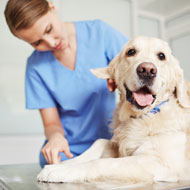What makes a good consultation?

It is vital to remember that you are not the only expert and your client might be very knowledgeable about their pet’s condition.
“An extension of the consult is the experience you get in reception as well”.
That was one of the key messages presented by PhD student Louise Corah at Cx Congress (16 June) on what makes a good veterinary consultation. During her presentation, Louise presented feedback from owners, explained why that feedback matters, and offered her ‘top tips for a top consult’.
Louise’s research shows that the veterinary practice is no longer the only place clients can get information about their pet. Family and friends, ‘Dr Google’, books, social media, personal experience and research articles all play a part in shaping our client’s knowledge. But this doesn’t mean that they don’t care about what the vet has to say. It just means that the vet’s opinion is part of a much wider circle.
What matters most?
So what matters to the veterinary client? Louise explained that clients like to be made to feel welcome. So, even if your customer care team are on the phone when they arrive, a smile and an acknowledgement of the client's presence can make a world of difference.
Clients also want to feel like you know or care about them, she said. So if it is the first time the client is visiting the practice, be enthusiastic and try to build up some rapport. If they are a regular client, they value people making a fuss over their pet and acknowledging they might be feeling unwell.
Cleanliness also matters to clients. If your practice looks shabby, it looks dirty or it smells, people will pick up on that, said Louise. Veterinary staff that smell like cigarettes or have scrubs covered in stains do not appear very professional.
When in the waiting room, it’s the little things that make a big difference. If the vet is running behind, communicate with the waiting client about why there is a delay and offer them a cup of tea or the opportunity to re-schedule. You don’t need to include the gory details, said Louise, but an acknowledgement that you value their time makes all the difference.
During the consultation, listen to the client and hear what they are saying. It is vital to remember that you are not the only expert and your client might be very knowledgeable about their pet’s condition.
Louise’s top tips for a top consult
• listen
• be open minded
• show that you care
• remember that you’re not the only expert
• be human
• you’re all on the same team.



 The Veterinary Medicines Directorate (VMD) is inviting applications from veterinary students to attend a one-week extramural studies (EMS) placement in July 2026.
The Veterinary Medicines Directorate (VMD) is inviting applications from veterinary students to attend a one-week extramural studies (EMS) placement in July 2026.